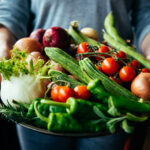Organic farming practices beat conventional methods, 40-year report suggests
 (NaturalHealth365) The organic versus conventional farming “debate” has been going on for years. While many touted the benefits of organic, some so-called experts claim that organic farming has no added value to the consumer. But, now those arguments against organic are finally being put to rest.
(NaturalHealth365) The organic versus conventional farming “debate” has been going on for years. While many touted the benefits of organic, some so-called experts claim that organic farming has no added value to the consumer. But, now those arguments against organic are finally being put to rest.
A four-decade-long examination of organic grain cropping in the United States has found that growing organic is superior to using pesticides and chemicals to grow food. The Farming Systems Trial – 40-Year Report, published by Rodale Institute, provides a comprehensive analysis and comparison between organic and conventional farming using pesticides and chemicals.
Organic farming offers many benefits to ecosystems and people
In the report, researchers published some surprising results:
- Organic systems are up to 6 times more profitable than conventional production
- The yields for organic and conventional were the same following a five-year transition period for the organic system
- Droughts had less of an effect on organic systems, with organic yields topping out at 40% higher than conventional yields
- Conventional farming that is pesticide intensive leaches toxic compounds into nearby rivers, lakes, and other waterways – organic systems do not leach any toxic substances
- Organic systems use 45% less energy than conventional systems
- Organic systems also beat conventional systems in carbon emissions by 40%
Other studies and reports, including the Farming Systems Trial (FST), have had similar findings, but this is one of the largest and longest studies, and the results are hard to argue against.
Farming Systems Trial documents impacts of organic and conventional grain cropping systems
Rodale Institute’s Farming Systems Trial was launched in 1981 to address the adoption barriers of organic farming by farmers. It contains 72 experimental plots that are divided into three groups. Each group is managed using a specific approach to farming:
- Organic Manure represents a typical organic beef or dairy operation with perennial forage crops and annual feed grain crops rotated, composted manure periodically, and fertilized through legume cover crops. Primary pest defense is diverse crop rotation.
- Organic Legume represents a typical cash grain operation with cover crops and grain crops rotated mid-length annually. Sole fertilizers are cover crops. Pest defense is only crop rotations.
- Conventional Synthetic represents a typical grain-producing enterprise in the U.S. with synthetic herbicides to control weeds and synthetic nitrogen fertilizer for crops.
Within the three groups, some are tilled, and some are not. This provides a total of six different systems for study.
Discover a Simple and Effective Way to Remove Toxins: This is Jonathan's #1 choice for at-home detoxification. Special offer ends Feb. 16.
Which soil do you want your food to grow in?
The soil for the conventional system is laden with pesticides and chemicals used to control weeds and enhance crops. However, those substances can seep into the food and are ingested by animals and humans. Animals that consume the contaminated food are often animals like beef and dairy cattle.
The soil used for organic systems is a completely different story. It is a healthy soil that has a number of beneficial organisms like nematodes, algae, bacteria, protozoa, fungi, and more. Each of these contributes to soil health as well as plant health, yielding better quality food for humans and animals. This results in better quality, healthier beef and dairy. Healthy soil also holds water making it more effective in aiding plants in surviving a drought.
Support the organic movement
The best way to support organic farming is to buy organic. The more people purchase organic products, the more demand they will create. Shopping locally also minimizes the processes between farm and table, where imported produce is often stored in a warehouse for months, and some are chemically ripened when preparing for sale.
Look for the USDA Organic Seal wherever you purchase your food, and make it a point to buy local and organic when you can. It is healthier for you, and you can support the local economy by supporting local growers and farmers in your area.
Sources for this article include:
BeyondPesticides.org
RodaleInstitute.org
RodaleInstitute.org
RodaleInstitute.org
FoodRenegade.com
USDA.gov



